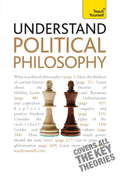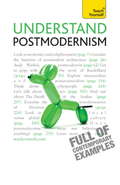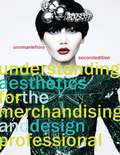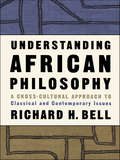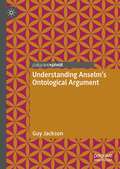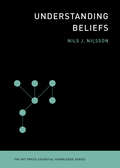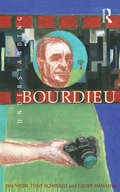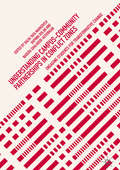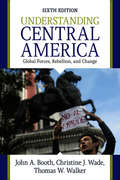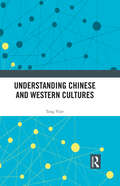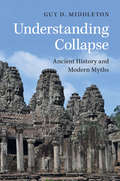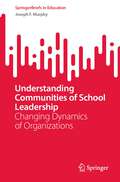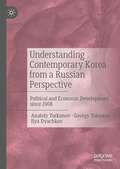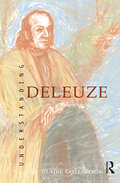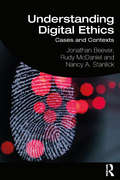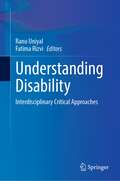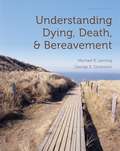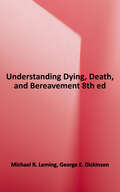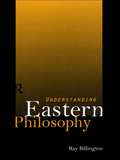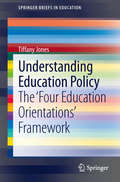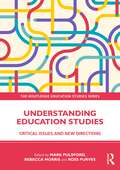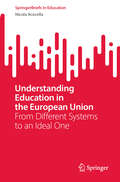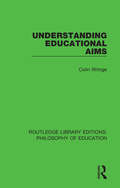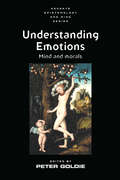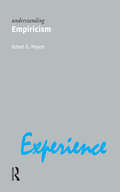- Table View
- List View
Understand Political Philosophy: Teach Yourself (Teach Yourself General)
by Mel ThompsonUnderstand Political Philosophy is an in-depth guide to the philosophers and political ideas who have shaped our society. Quickly and easily get to grips with the key thinkers and theories, from Aristotle to Wollstonecraft, from capitalism to utilitarianism. With exploration of contemporary issues and current debates, this book will put political philosophy in the context of the world we live in today.NOT GOT MUCH TIME?One, five and ten-minute introductions to key principles to get you started.AUTHOR INSIGHTSLots of instant help with common problems and quick tips for success, based on the author's many years of experience.TEST YOURSELFTests in the book and online to keep track of your progress.EXTEND YOUR KNOWLEDGEExtra online articles at www.teachyourself.com to give you a richer understanding of psychology.FIVE THINGS TO REMEMBERQuick refreshers to help you remember the key facts.TRY THISInnovative exercises illustrate what you've learnt and how to use it.
Understand Postmodernism: Teach Yourself (TY Philosophy)
by Glenn WardUnderstand Postmodernism is an indispensable guide to this sometimes challenging domain. Using contemporary examples to further your understanding, it takes a broad look at theorists in a range of disciplines. Whether you're encountering postmodernism for the first time, or you need a quick reference to support your studies, this guide offers a comprehensive introduction to the key ideas in this thought-provoking philosophy. NOT GOT MUCH TIME? One, five and ten-minute introductions to key principles to get you started. AUTHOR INSIGHTS Lots of instant help with common problems and quick tips for success, based on the author's many years of experience. TEST YOURSELF Tests in the book and online to keep track of your progress. EXTEND YOUR KNOWLEDGE Extra online articles at www.teachyourself.com to give you a richer understanding of psychology. FIVE THINGS TO REMEMBER Quick refreshers to help you remember the key facts. TRY THIS Innovative exercises illustrate what you've learnt and how to use it.
Understanding Aesthetics for the Merchandising and Design Professional
by Ann FioreBridging the gap between the study of aesthetics and its application in the merchandising and design environments, the 2nd Edition of Understanding Aesthetics presents a research-based focus on the concepts of aesthetics and their effect on product value and consumer behavior. The multisensory approach to studying the elements and principles of design helps students master the underlying factors of successful design and learn how products and their promotional surroundings can establish brand identity and create a pleasing environment for the consumer.
Understanding African Philosophy: A Cross-cultural Approach to Classical and Contemporary Issues (Philosophy and the Human Situation)
by Richard H. BellFirst published in 2002. Routledge is an imprint of Taylor & Francis, an informa company.
Understanding Anselm's Ontological Argument
by Guy JacksonAnselm's ontological argument is one of the most fascinating, most controversial, and most misunderstood arguments in the entire history of Western thought. By centring the argument firmly in the Neoplatonic tradition within which Anselm was writing, Understanding Anselm's Ontological Argument sheds fresh light and clarity on this enigmatic piece of philosophy. It argues that, far from resting upon a fallacy or illegitimately attempting to define God into existence, Anselm's argument is a powerful and plausible philosophical proof, and deserves to be taken seriously as such. Written to be understandable for specialists and non-specialists alike, Understanding Anselm's Ontological Argument is ideal for scholars and researchers in philosophy of religionand philosophy in the Middle Ages (especially Neoplatonism) as well as for medievalists in general.
Understanding Beliefs (The MIT Press Essential Knowledge Series)
by Nils J. NilssonWhat beliefs are, what they do for us, how we come to hold them, and how to evaluate them. Our beliefs constitute a large part of our knowledge of the world. We have beliefs about objects, about culture, about the past, and about the future. We have beliefs about other people, and we believe that they have beliefs as well. We use beliefs to predict, to explain, to create, to console, to entertain. Some of our beliefs we call theories, and we are extraordinarily creative at constructing them. Theories of quantum mechanics, evolution, and relativity are examples. But so are theories about astrology, alien abduction, guardian angels, and reincarnation. All are products (with varying degrees of credibility) of fertile minds trying to find explanations for observed phenomena. In this book, Nils Nilsson examines beliefs: what they do for us, how we come to hold them, and how to evaluate them. We should evaluate our beliefs carefully, Nilsson points out, because they influence so many of our actions and decisions.Some of our beliefs are more strongly held than others, but all should be considered tentative and changeable. Nilsson shows that beliefs can be quantified by probability, and he describes networks of beliefs in which the probabilities of some beliefs affect the probabilities of others. He argues that we can evaluate our beliefs by adapting some of the practices of the scientific method and by consulting expert opinion. And he warns us about “belief traps”—holding onto beliefs that wouldn't survive critical evaluation. The best way to escape belief traps, he writes, is to expose our beliefs to the reasoned criticism of others.
Understanding Bourdieu
by Tony Schirato Jen Webb Geoff DanaherBourdieu's work is formidable-the journey is tough. Follow this French foreign legion-take an apple, take a hanky-but take this book.Peter Beilharz , Professor of Sociology , La Trobe UniversityPierre Bourdieu's work on the sociology of culture and language, on practical reason, on education, on citizenship and the cultures of poverty, and on a range of other topics is now coming to be seen as one of the 20th century's most important contributions to our thinking about the world. Understanding Bourdieu is a comprehensive and lucid introduction to his work. Measured and judicious, it's the best road map of this significant body of work currently available.John Frow, Regius Professor of Rhetoric and English Literature, University of EdinburghYou name it, Pierre Bourdieu has written about it. Now considered one of the most influential thinkers of the 20th century, he has left his mark on most of the 'big' theoretical issues in the world of contemporary theory: gender, subjectivity, the body, culture, citizenship, and globalisation. His terms are now commonplace: 'social capital', 'cultural capital', 'field', and 'habitus'.Bourdieu examines how people conduct their lives in relation to one another and to major social institutions. He argues that culture and education aren't simply minor influences, but as important as economics in determining differences between groups of people. Unlike the other grand systematisers Marx and Foucault, Bourdieu has tested these arguments in detailed fieldwork. His range is eclectic, his vision is vast, and his writing is often dense and challenging.Understanding Bourdieu offers a comprehensive introduction to Bourdieu's work. It is essential reading for anyone tackling him for the first time.
Understanding Campus-Community Partnerships in Conflict Zones: Engaging Students for Transformative Change
by Nadera Shalhoub-Kevorkian Dalya Yafa Markovich Daphna GolanThis book explores the opportunities and limitations of campus-community partnerships in Israel. In a conflict-ridden society with a struggling civic culture, the chapters examine partnerships at ten academic institutions, focusing on the micro-processes through which these partnerships work from the perspectives of students, NGOs, and disadvantaged communities. The editors and contributors analyse the range of strategies and cultural repertoires used to construct, maintain, negotiate and resist the various partnerships. Evaluating the various challenges raised by campus-community partnerships exposes the institutional and epistemological divides between academia and the community, and thus offers valuable insights into the ways partnerships can contribute to transformative change in conflict zones. This book will be of interest and value to researchers and students of campus-community partnerships as well as the anthropology of inclusion-exclusion and civic culture.
Understanding Central America
by Christine J. Wade John A. Booth Thomas WalkerUnderstanding Central America explains how domestic, global, political, and economic forces have shaped rebellion and regime change in Costa Rica, Nicaragua, El Salvador, Guatemala, and Honduras throughout their histories, during the often-turbulent 1970s and since. The authors explain the origins and development of the region’s political conflicts, their resolution and ongoing political change. This sixth edition provides analysis of citizens’ attitudes and participation through 2012 and up-to-date information on political changes in each of the five countries, including the 2013 and 2014 elections. Recent developments include dramatic changes in party systems in Honduras, Costa Rica, and Nicaragua; the extremely narrow victory of the newly elected FMLN president in El Salvador; and Guatemala’s prosecution of human rights abusers. This book is an essential resource, as it provides a comprehensive introduction to the region and a model for how to convey its complexities in accessible language.
Understanding Chinese and Western Cultures
by Tang YijieThe title is a collection of essays centering on the topic of intercultural communication between Chinese and Western cultures by Tang Yijie, one of the most renowned philosophy scholars in China.Comprised of five parts, the author discusses how Chinese culture should modernize itself through borrowing from Western culture premised on a self-awareness of Chinese culture per se. The book begins by critiquing theories of the so-called clash of civilizations and new empires and argues for the coexistence of cultures and a global consciousness instead. Chapters in the second part revisit contemporary Chinese culture in transition and call for the cultural integration of China and the West, with China defined in both its ancient and modern guises. By providing reflections on the cultural trends of the 1980s and 1990s, the third part illustrates the inevitable growth of diversified cultural development while analyzing cases of cultural dialogue in history, philosophy and religion. The fourth part demonstrates the significance of culture diversity and interaction while the fifth provides thoughts and reflections on some real-life cultural issues.This title will appeal to all levels of readers interested in Chinese culture, cross-cultural studies and topics of cultural pluralism.
Understanding Collapse: Ancient History and Modern Myths
by Guy D. MiddletonUnderstanding Collapse explores the collapse of ancient civilisations, such as the Roman Empire, the Maya, and Easter Island. In this lively survey, Guy D. Middleton critically examines our ideas about collapse - how we explain it and how we have constructed potentially misleading myths around collapses - showing how and why collapse of societies was a much more complex phenomenon than is often admitted. Rather than positing a single explanatory model of collapse - economic, social, or environmental - Middleton gives full consideration to the overlooked resilience in communities of ancient peoples and the choices that they made. He offers a fresh interpretation of collapse that will be accessible to both students and scholars. The book is an engaging, introductory-level survey of collapse in the archaeology/history literature, which will be ideal for use in courses on the collapse of civilizations, sustainability, and climate change. It includes up-to-date case studies of famous and less well-known examples of collapses, and is illustrated with 25 black and white illustrations, 3 line drawings, 16 tables and 18 maps.
Understanding Communities of School Leadership: Changing Dynamics of Organizations (SpringerBriefs in Education)
by Joseph F. MurphyThis book examines the evolution of schooling from bureaucracy and hierarchy to post-industrial schools, and places teachers’ leadership on center stage at the same time. That is, it asks teachers to deepen leadership in their classrooms and with other teachers. The book carries education and schooling from formal control to a social influence process and addresses the deeply rooted difficulty of focusing too much energy on content. It reveals the strong power of internal and external context and helps educators implant the idea of the school not as a fixed, immutable home, but as a relatively deep social process. It shows how co-leadership comes alive in schools. Communities of schooling is one of the three most critical developments in education in the last 140 years. When it is linked with the two other fundamental reorientations in schooling - “dispersed ownership” and “constructivist work” - it becomes the most powerful force in education since the 1700s. This book shows how communities of schooling replace the earlier pillars of “learning as telling,” “hierarchy of control,” and “non-democratic influence.” The work also explains the meaning and understanding of school work as a social influence process where all school-based educators exert power, but at different levels. The idea of enhancing individual and collective capacity through interdependency, shared work, and collective responsibility is unpacked.
Understanding Contemporary Korea from a Russian Perspective: Political and Economic Development since 2008
by Anatoly Torkunov Georgy Toloraya Ilya DyachkovThis book presents a comprehensive overview of political and economic developments as well as security issues in the Korean Peninsula during 2008–2020 from a Russian perspective. The authors offer a rich analysis of domestic affairs in both Korean states and the international situation they act in. The book’s first section, Diverging Development Paths, analyzes the evolution of North and South Korea in the early twenty-first century. The next section, The Nuclear Challenge, assesses Seoul’s and Pyongyang’s foreign policy options within ever-changing domestic and international circumstances – under the looming nuclear shadow. The final section, Partnering with Russia, presents an unprecedented first-hand account of Seoul’s and Pyongyang’s dealings with Moscow. The book provides a unique account with expertise from Russia, one of the four states directly involved in Korean affairs, providing insights on domestic and diplomatic decision-making of the two Korean states and international efforts to resolve the nuclear issue.
Understanding Deleuze
by Claire Colebrook'The best introduction to Deleuze, and to the collective writings of Deleuze and Guattari, available yet! Claire Colebrook has produced a truly accessible pathway into the labyrinthine enchantments offered for contemporary thought by Deleuzianism, making concepts clear, showing their political and theoretical complexity, elaborating their social and artistic relevance. A wonderful, lucid opening onto the new worlds of Deleuze.'Elizabeth Grosz, Rutgers University'A wonderfully clear introduction to key Deleuzian concepts and to their effectiveness in fields ranging from ethics and politics to cinema, literary and cultural studies. Claire Colebrook provides a series of effortless transitions from Deleuze's philosophical concerns (eg: difference, representation, desire and affect) to concrete problems in a variety of fields. This book is an excellent guide to an important body of critical thought.'Paul Patton, Professor of Philosophy, University of NSWA genuine attempt to think differently, Gilles Deleuze's work challenges, provokes and frustrates. Surprisingly practical as well as innovative, it is now being seen as a 'must read' for students and scholars across the humanities and social sciences. Claire Colebrook's Understanding Deleuze offers a comprehensive and very accessible introduction to his work. hink differently. It is built on the notion of an immanent ethics: how can we have a political and ethical theory without some external foundation such as the subject or morality? He argues that the only way we can do this is with a theory of the virtual, and he sees all life (not just cyberculture) as virtual. Deleuze goes further than Foucault or Derrida in questioning the boundaries of the subject and knowledge. For Deleuze perception extends beyond the human, to animals, machines and microorganisms.Deleuze's writing is challenging and hard to read, and so far there is no introduction to his work. Claire Colebrook's primer offers an accessible introduction to the whole Deleuzian oeuvre, including the work he did with Guattari.
Understanding Digital Ethics: Cases and Contexts
by Nancy A. Stanlick Rudy McDaniel Jonathan BeeverRapid changes in technology and the growing use of electronic media signal a need for understanding both clear and subtle ethical and social implications of the digital, and of specific digital technologies. Understanding Digital Ethics: Cases and Contexts is the first book to offer a philosophically grounded examination of digital ethics and its moral implications. Divided into three clear parts, the authors discuss and explain the following key topics: • Becoming literate in digital ethics • Moral viewpoints in digital contexts • Motivating action in digital ethics • Speed and scope of digital information • Moral algorithms and ethical machines • The digital and the human • Digital relations and empathy machines • Agents, autonomy, and action • Digital and ethical activism. The book includes cases and examples that explore the ethical implications of digital hardware and software including videogames, social media platforms, autonomous vehicles, robots, voice-enabled personal assistants, smartphones, artificially intelligent chatbots, military drones, and more. Understanding Digital Ethics is essential reading for students and scholars of philosophical ethics, those working on topics related to digital technology and digital/moral literacy, and practitioners in related fields.
Understanding Disability: Interdisciplinary Critical Approaches
by Ranu Uniyal Fatima RizviThis edited volume brings together contributions on disability studies organized around two themes: literary and sociological aspects. The contributors include academics, disability activists, and researchers from within and outside the Indian periphery. While the book strengthens the disability discourse and contributes to building academic scholarship on this subject, it also promotes disability activism by giving space to both direct practitioners and persons with disabilities. The chapters discuss various analytical and literary aspects of the marginalization experienced by the disabled community and bring forth new and elaborate perspectives. It draws connections across multiple identities and includes personal narratives across nations, cultures and societies. It is an excellent research resource on disability studies in India for scholars and students in the area of humanities, education, law, sociology and social work, while at the same time also addressing the global context.
Understanding Dying, Death, and Bereavement
by Michael R. Leming George E. DickinsonUsing a social-psychological approach, this edition remains solidly grounded in theory and research, but places greater emphasis on the individual and coping with death and dying. These two well-known authors and researchers integrate stimulating personal accounts throughout the text, and apply concepts to specific examples that deal with cross cultural perspectives and the practical matters of death and dying.
Understanding Dying, Death, and Bereavement
by Michael R. Leming George E. DickinsonUsing a social-psychological approach, the new edition of this book remains solidly grounded in theory and research, while also providing useful information to help individuals examine their own feelings about-and cope with-death and grieving. The well-known authors and researchers integrate stimulating personal accounts throughout the text, and apply concepts to specific examples that deal with cross-cultural perspectives and the practical matters of death and dying.
Understanding Eastern Philosophy
by Ray BillingtonUnderstanding Eastern Philosophy provides an accessible critical introduction to how some of the key philosophies of the East compare with those in the West. Starting from a discussion of the problems of distinguishing between religions and philosophies, Ray Billington presents a clear picture of the key tenets behind Hinduism, Buddhism, Taoism, Jainism and Confucianism.Moving on to compare the key themes of religious philosophy that cut across East and West, such as a belief in God, the soul, moral decision-making, nature and authority, Understanding Eastern Philosophy presents a fascinating and controversial picture of the contribution theistic religions have to make. With its belief in a personal God bestowing a particular version of 'truth', Ray Billington concludes that the universal mysticism characteristic of Eastern thought provides a more realistic and rewarding path than is commonly supposed in the West.Understanding Eastern Philosophy assumes no prior knowledge of religion or philosophy.
Understanding Education Policy
by Tiffany JonesAnalysis of education policy often follows a particular orientation, such as conservative or neo-liberal. Yet, readers are often left to wonder the true meaning and conceptual framing behind these orientations. Without this knowledge, the policy analysis lacks true rigor, its value is diminished as the results may prove difficult to reproduce. Understanding Education Policy provides an overarching framework of four key orientations that lie beneath much policy analysis, yet are rarely used with accuracy: conservative, liberal, critical and post-modern. It details each orientation's application to policy making, implementation and overall impact. The book also argues the value of analysing a policy's orientation to improve the clarity of its analysis and allow broader trends across the education policy field to emerge. The book offers practical examples, key vocabulary and reflection activities which give equitable, yet critical consideration to all education orientations. This allows readers to see the benefits and disadvantages of each perspective and discover their own biases. This introduction to education policy analysis offers theoretically broad, highly practical coverage. It is adaptable to many kinds of policy analysis areas and will appeal to a wide range of readers with an interest in education policy, from students conducting specific research to policy makers looking for a deeper way to re-think their work.
Understanding Education Studies: Critical Issues and New Directions (The Routledge Education Studies Series)
by Mark PulsfordThis book explores undergraduate education programmes in a new way. Written by those at the forefront of teaching and learning, it encourages students to delve beneath the surface of their degree subject and reveals important insights about the how, why and where next for education studies. With contributions from course leaders, tutors, current students and recent graduates, this book offers insights from nearly 60 authors based in 20 different institutions from five different countries. The chapters offer opportunities for readers to consider their own learning experiences in a wider context, enhance their understanding of the degree course and actively shape the education studies community of the future. Each chapter is written in an accessible way, with ‘questions to consider’ throughout and ‘recommended readings’ at the end to advance readers’ thinking and reflections. Chapters cover topics such as: Education Studies’ development as a degree subject Its evolving identity, values and purposes Teaching and assessment approaches in undergraduate education programmes How the subject develops students’ professional aptitudes and transferable skills Possibilities for advancing inclusion, equity and justice in education at degree level These ‘behind the scenes’ factors are brought to the fore through case studies and examples of how lecturers and students make sense of their teaching and learning. With its unique approach to examining these issues, this book is essential for students of Education Studies at undergraduate level while also being relevant for staff and postgraduate students in education.
Understanding Education in the European Union: From Different Systems to an Ideal One (SpringerBriefs in Education)
by Nicola AcocellaThis book examines the importance of education in the European context, from knowledge acquisition to its instrumental nature. It provides a short history of education of schools around the world before delving into the comparisons of European education systems through exploration of their organization, teaching methods, attendance models and public versus private provision and costs. Additionally, it discusses the existence of NEETs (Not in Education, Employment, or Training) within these systems. Starting with addressing the six dimensions of the European Education Area devised by the Bologna Process, it concludes with identifying a need for a superior education model that accommodates different aspects of education which is not yet satisfactorily achieved by any existing systems, offering insight into an ideal education system. Inviting reflection on the role of education and its future, educators, educational administrators, and those interested in understanding and improving the functioning of schools find this book of great value.
Understanding Educational Aims (Routledge Library Editions: Philosophy of Education #21)
by Colin WringeThis text, first published in 1988, examines the underlying rationale of educational aims as applied to individual pupils, social policies and supposedly intrinsic values. This book explores traditional educational aims such as developing the potential and autonomy of individuals or the promotion of rationality as well as more contemporary and often controversial ones. The author provides a clear and balanced justification of educational aims which teachers need in order to combat the rhetoric of changing fashion or the pressures of political and managerial opportunism. This book is essential reading both for students and teachers.
Understanding Emotions: Mind and Morals (Ashgate Epistemology and Mind Series)
by Peter GoldieUnderstanding Emotions presents eight original essays on the emotions from leading contemporary philosophers in North America and the U.K: Simon Blackburn, Bill Brewer, Peter Goldie, Dan Hutto, Adam Morton, Michael Stocker, Barry Smith, and Finn Spicer. Goldie and Spicer's introductory chapter sets out the key themes of the ensuing chapters: surveying contemporary philosophical thinking about the emotions, and raising challenges to a number of prejudices that are sometimes brought to the topic from elsewhere in the philosophy of mind and moral philosophy. Brewer, Hutto, Goldie and Smith explore the conceptual and epistemological problems of other minds that the emotions raise, and how the emotions can be a source of knowledge of the world around us. The chapters by Stocker, Blackburn and Morton are broadly concerned with issues in morality: Stocker argues for the traditional Aristotelian view that emotions reveal value and are constitutive of value; Blackburn, from a more Augustinian perspective, argues that the virtuous person, like the rest of us, will be emotional but he or she will have the right emotions towards the right objects; Morton questions the idea of emotions and narrative as sources of self-understanding. An extensive bibliography completes the book. Drawing together the arguments of leading contemporary philosophers, focusing on issues in the philosophy of mind, epistemology and moral philosophy, this book offers a wide and deep understanding of the emotions, and will be of interest across the philosophical spectrum to students and researchers of this fascinating and important topic.
Understanding Empiricism (Understanding Movements In Modern Thought Ser.)
by Robert G. Meyers"Understanding Empiricism" is an introduction to empiricism and the empiricist tradition in philosophy. The book presents empiricism as a philosophical outlook that unites several philosophers and discusses the most important philosophical issues bearing on the subject, while maintaining enough distance from, say, the intricacies of Locke, Berkeley, Hume scholarship to allow students to gain a clear overview of empiricism without being lost in the details of the exegetical disputes surrounding particular philosophers. Written for students the book can serve both as an introduction to current problems in the theory of knowledge as well as a comprehensive survey of the history of empiricist ideas. The book begins by distinguishing between the epistemological and psychological/causal versions of empiricism, showing that it is the former that is of primary interest to philosophers. The next three chapters, on Locke, Berkeley, Hume respectively, provide an introduction to the main protagonists in the British empiricist tradition from this perspective. The book then examines more contemporary material including the ideas of Sellars, foundations and coherence theories, the rejection of the a priori by Mill, Peirce and Quine, scepticism and, finally, the status of religious belief within empiricism. Particular attention is paid to criticisms of empiricism, such as Leibniz's criticisms of Locke on innatism and Frege's objections to Mill on mathematics. The discussions are kept at an introductory level throughout to help students to locate the principles of empiricism in relation to modern philosophy.
